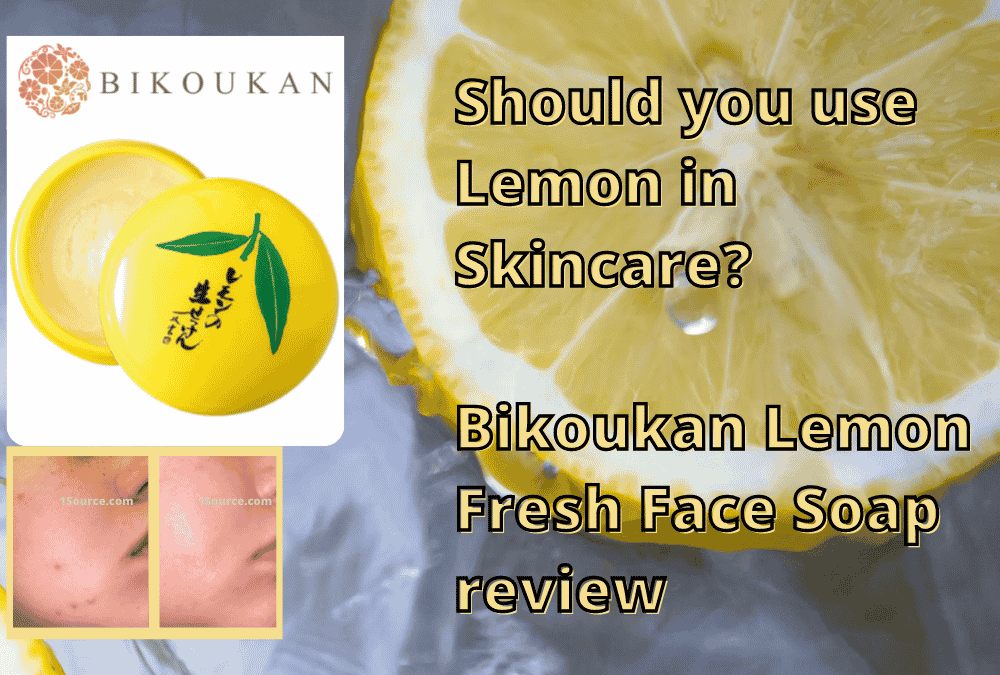It’s safe to assume that Hong Kong shoppers love to explore the Japanese Discount / Department Store, Don Quijote (ドン・キホーテ) or more popularly known, Don Don Donki. As a skincare junkie, I somehow would end up peeking at the skincare aisle even though my intention was to do some grocery shopping (guilty!) And this time, the lemon fresh face soap was the winner.
In this article, I will be reviewing the Bikoukan Lemon Fresh Face Soap and discuss the debate of using lemon in skincare.
Bikoukan Lemon Fresh Face Soap (HKD$152.60)
A before-and-after testimonial photo was posted above the price tag dedicated to the face soaps sold by Bikoukan. Vitamin C is a known skincare-must ingredient, but to market a soap that seems to suggest the main ingredient as lemon is an intense statement. Generally, citrus fruits like lemon, orange, bergamot, are considered too acidic for the skin. This ideology will be discussed later in the article.
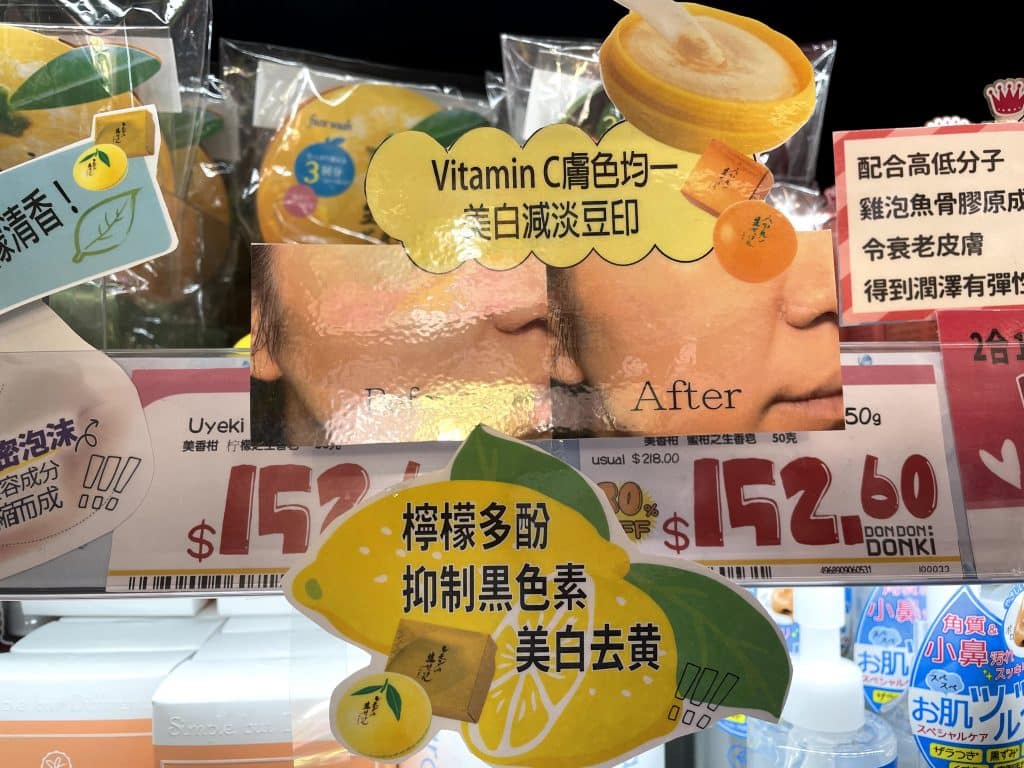
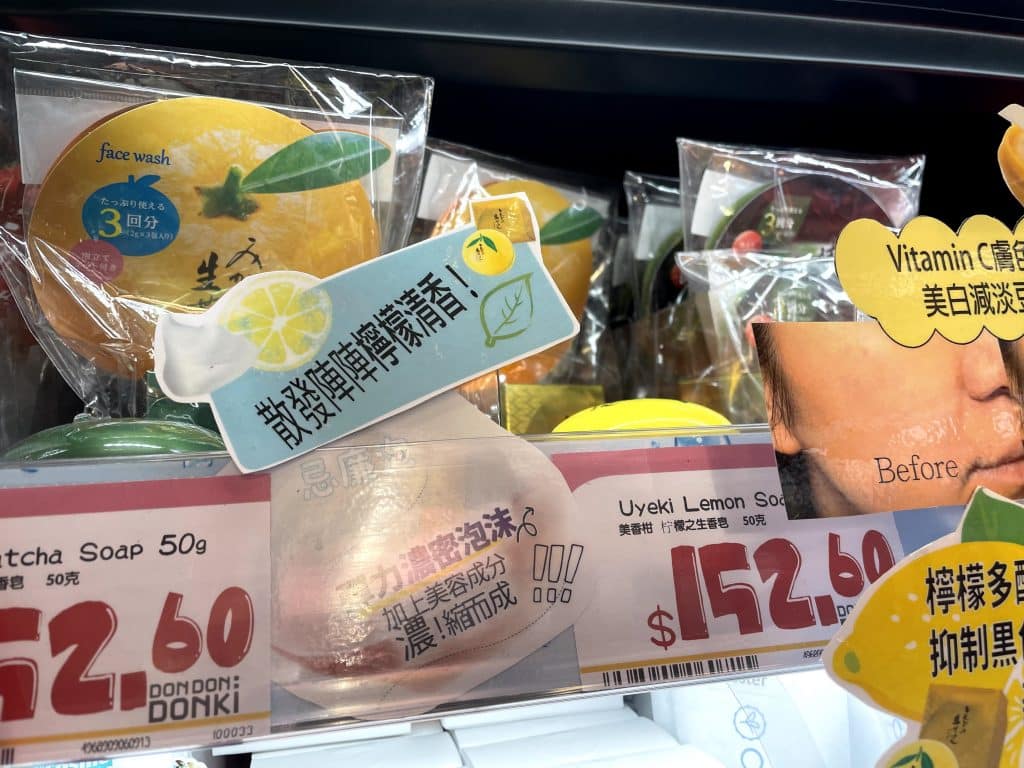
Translation:
Vitamin C膚色均一減淡豆印 = Vitamin C can even skin tone and lighten acne marks
檸檬多酚抑制黑色素美白去黃 = Lemon polyphenols can inhibit melanin, and whitening skin effectively
散發陣陣檸檬清香 = Exuding bursts of lemon fragrance
The product includes:
- mesh pocket – for rubbing the soap together to make it foam
- the lemon face soap – the consistency is hard cream
- scooper – for scooping the soap into the mesh
- manual and instructions – includes website QR code, method of use and background information (all in Japanese)
- Others: Mikan orange face wash sample and extra mesh (not shown in image)
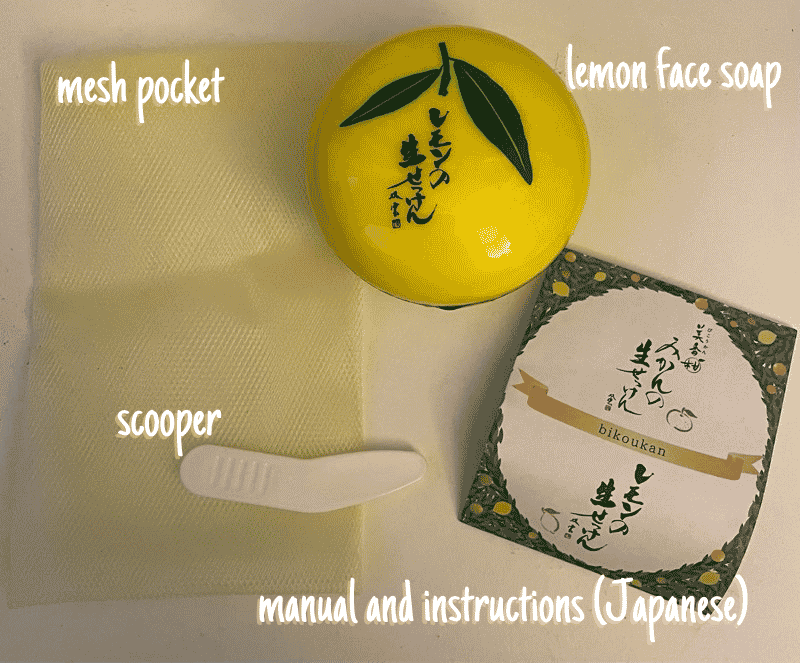
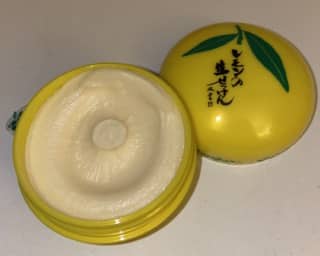
As I can’t read Japanese, I couldn’t get the proper authentic information from the manual and Bikoukan’s website. However, Bikoukan’s product information is still accessible in English, like YesStyle.
According to YesStyle’s description of Bikoukan as a brand. It was developed by UYEKI Co. Ltd., which adopts the philosophy of ‘creating products that are gentle for the skin and being environmentally friendly.’ The two popular products, Mikan Orange and Lemon fresh soap, contain unshiu (Satsuma Mandarin) and green lemons, organically grown and cultivated from Omishima Island. Additionally, the brand is earning recognition among celebrities in Japan ‘some of whom even add the brand’s soap to their skincare routine.’

My Review
Method of use: Scoop the ‘size of cherries’ and rub it in the mesh to make it foam, massage the face (60 seconds method) and wash it off.
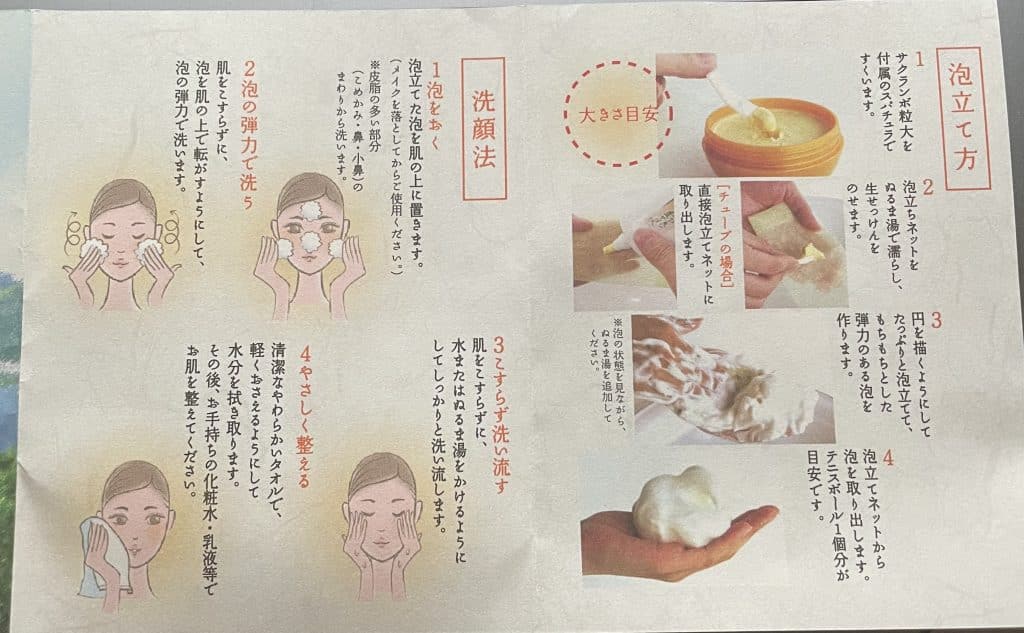
I used it three times a week (Monday, Wednesday, and Friday), here is my impression:
- A little goes a long way! A lot of foam is made from the little scoop, enough to cleanse the face, neck, and chest.
- The smell is divine! However, it is to note that the product includes fragrance. Users with sensitive skin could find this irritating.
- After cleansing, I noticed that it was a little bit stripping, the skin feels tight and has no feel of natural oils. For the sake of the review, I didn’t apply moisturiser after my first 2 washes. My skin would feel dry before bed, but it felt plump the following morning. (I put on Visible Ingredient’s moisturiser and spray mask after the 3rd wash)
- My pimples become less inflamed upon cleansing.
As observable by my testimonial, the face soap works excellently. I see myself including this soap in my skincare routine. As it would become regular, I would apply moisturiser after and include niacinamide to tone out the redness in my skin.
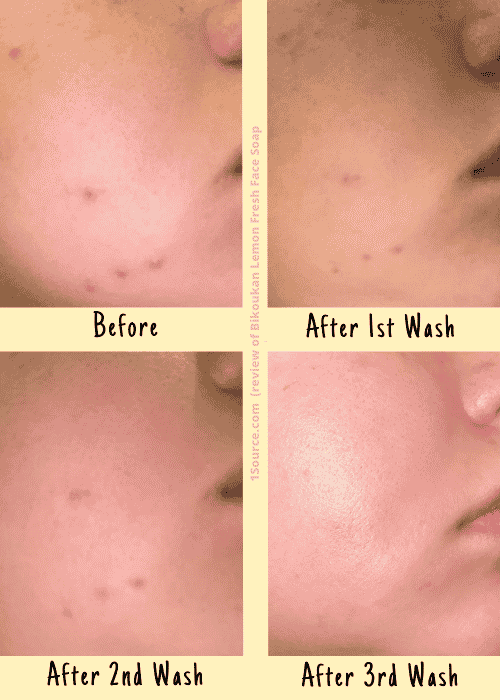
Ingredient Insight:
Currently, the Bikoukan Lemon Fresh Face Soap is rated 5 on the 1Source Potential Risk Index. Understandably, as this product has ethanol, fragrance and unidentifiable ingredients for lack of data.
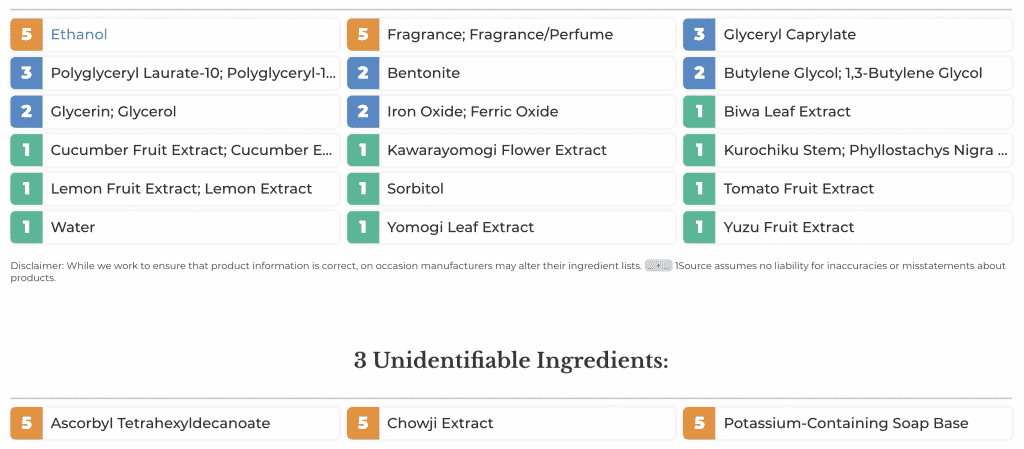
On 1Source, Ethanol is an astringent, causing the contraction of body tissues, typically of the skin. This means that the skin would look tighter. However, sensitive skin users should be aware of the amount of ethanol in their products as ethanol is a simple alcohol which could cause irritation.
Fragrance on the other hand is a tricky ingredient. It is usually advised that sensitive skin users should stray away from fragrant products as it could have irritating and harmful chemicals. “Fragrance or alike is not an individual ingredient, but it refers to a range of natural and synthetic compounds. As there are no clear guidelines or disclosures of the compositions of fragrances, consumers should be aware of its potential unknown health effects.”
Lemon: straight-up acid or holy grail?
In continuing the discussion from earlier, there are two views of lemon as a skincare ingredient.
On the one hand, it is too acidic for the skin. I believe that this idea stems from the several uses of lemon in household remedies as a cleaning agent like stain removing or a bleaching agent like teeth whitening. No matter true or not, lemon has this reputation. The label Vitamin C would be more susceptible than ‘lemon’ because it indicates that manufacturers extracted the skincare properties of the citrus.
While on the other hand, because citrus fruits are rich in Vitamin C, the marketing of lemon in skincare is not worth puckering for.


A research from 2011 studied the effects of lemons in skincare. In this experiment, the lemon peel was homogenized (reducing a substance to extremely small particles and dispersing them uniformly throughout a fluid) and subsequently applied to an agar plate that was then incubated. The results show that lemon peels have properties as an astringent (causing the contraction of body tissues, typically of the skin) and an antimicrobial (preventing the growth of unwanted microorganisms). The researchers explained that the results mean that the peels of lemon are great for disinfecting the skin, such as curing acne and reducing the production of sebum. (Dhanavade et al. 2011)
However, any fruit which contains furocoumarin reacts with UV light, causing sunburns, melasma, hyperpigmentation, and skin rashes. Additionally, lemon juice is very acidic. It can kill the good bacteria necessary for maintaining healthy skin and damage its protective barrier. “Lemon juice is just not nearly as effective as an anti-oxidant as a pharmaceutical-grade serum” (Watterworth, 2021)
What to draw out from the researches
The research that shows lemon as a suitable ingredient for skincare is extracted somehow. It is never directly applied from the fruit. Watterworth’s article emphasized the difference between a consumer vitamin c product and homemade ones made from raw lemons. Both types of products work well as an antioxidant for the skin. However, manufacturers operate by eliminating the furocoumarin that we at home could not do as effectively, or even at all (Watterworth, 2021)
This is not to say that you should never ever make a DIY face mask anymore. Some people stand by using raw ingredients and saving money from buying the goods at a store, and there are multiple positive results! Having said that, if you were to do the lemon-honey face mask to clear your acne scars, brighten sun spots, or tighten pores, you have to know that there is a risk that you may harm your skin barrier. Maybe you could replace the recipe with Huda Beauty’s DIY mask consisting of plain organic yogurt, organic honey, and turmeric. (Is turmeric good for skincare? Here’s what we have to say for now)

References
Bikoukan lemon fresh face soap. (n.d.). YesStyle. Retrieved December 11, 2021, from https://www.yesstyle.com/en/bikoukan-lemon-fresh-face-soap-50g/info.html/pid.1068354831
Dhanavade, M. J., Jalkute, C. B., Ghosh, J. S., & Sonawane, K. D. (2011). Study antimicrobial activity of lemon (Citrus lemon L.) peel extract. British Journal of pharmacology and Toxicology, 2(3), 119-122.
Watterworth, M. (2021, April 7). Keep the lemon juice off your face! SkinScience. https://skinscience.md/keep-the-lemon-juice-off-your-face/
(n.d.). ウエキ公式オンラインショップ‐UYEKI ONLINESHOP. Retrieved December 11, 2021, from https://shop.uyeki.co.jp/
(n.d.). 香り良い無添加洗顔石鹸 みかんの生せっけん 美香柑(びこうかん). Retrieved December 11, 2021, from https://www.bikoukan.jp/

